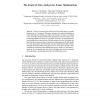Free Online Productivity Tools
i2Speak
i2Symbol
i2OCR
iTex2Img
iWeb2Print
iWeb2Shot
i2Type
iPdf2Split
iPdf2Merge
i2Bopomofo
i2Arabic
i2Style
i2Image
i2PDF
iLatex2Rtf
Sci2ools
122
click to vote
CC
2004
Springer
2004
Springer
The Limits of Alias Analysis for Scalar Optimizations
In theory, increasing alias analysis precision should improve compiler optimizations on C programs. This paper compares alias analysis algorithms on scalar optimizations, including an analysis that assumes no aliases, to establish a very loose upper bound on optimization opportunities. We then measure optimization opportunities on thirty-six C programs. In practice, the optimizations are rarely inhibited due to the precision of the alias analyses. Previous work finds similarly that the increased precision of specific alias algorithms provide little benefit for scalar optimizations, and that simple static alias algorithms find almost all dynamically determined aliases. This paper, however, is the first to provide a static methodology that indicates that additional precision is unlikely to yield improvements for a set of optimizations. For clients with higher alias accuracy demands, this methodology can help pinpoint the need for additional accuracy.
Alias Analysis | Alias Analysis Algorithms | CC 2004 | Programming Languages | Scalar Optimizations |
Related Content
| Added | 01 Jul 2010 |
| Updated | 01 Jul 2010 |
| Type | Conference |
| Year | 2004 |
| Where | CC |
| Authors | Rezaul Alam Chowdhury, Peter Djeu, Brendon Cahoon, James H. Burrill, Kathryn S. McKinley |
Comments (0)

